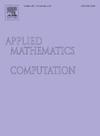Group size dynamics for a group following game with shared rewards
IF 3.4
2区 数学
Q1 MATHEMATICS, APPLIED
引用次数: 0
Abstract
We consider a population game in which a group of mobile individuals must repeatedly decide between two strategies: following other neighbors or moving on their own. When following others there is an improvement due to directed motion but a sharing of the credit for any rewards obtained. Conversely, the individual strategy provides for a full share of the credit for any rewards obtained at the cost of less-directed motion. This process leads to a dilemma with dynamically adjusting strategies and a resulting dynamic change in the number of group followers. The process is modeled as an evolutionary game with simple parameters that describe the differences in the motion opportunities and the sharing of rewards. A detailed analysis of the dynamics of the game is presented to show how the parameters affect the resulting equilibria solutions. Numerical methods are used to validate the analysis conclusions and simulations are performed to validate the analytical model of the evolutionary game.
分享奖励的群体规模动态
我们考虑一个人口博弈,在这个博弈中,一群移动的个体必须在两种策略之间反复做出选择:跟随其他邻居还是自己移动。当跟随他人时,由于定向运动而有所改善,但分享所获得的任何奖励。相反,个体策略提供了以较少定向运动为代价获得的任何奖励的全部份额。这一过程导致了动态调整策略的困境,并导致群体追随者数量的动态变化。这个过程被建模为一个进化游戏,用简单的参数来描述运动机会和奖励分享的差异。详细分析了博弈的动力学,以显示参数如何影响最终的平衡解。采用数值方法对分析结论进行了验证,并对进化博弈的分析模型进行了仿真验证。
本文章由计算机程序翻译,如有差异,请以英文原文为准。
求助全文
约1分钟内获得全文
求助全文
来源期刊
CiteScore
7.90
自引率
10.00%
发文量
755
审稿时长
36 days
期刊介绍:
Applied Mathematics and Computation addresses work at the interface between applied mathematics, numerical computation, and applications of systems – oriented ideas to the physical, biological, social, and behavioral sciences, and emphasizes papers of a computational nature focusing on new algorithms, their analysis and numerical results.
In addition to presenting research papers, Applied Mathematics and Computation publishes review articles and single–topics issues.

 求助内容:
求助内容: 应助结果提醒方式:
应助结果提醒方式:


